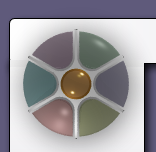|
|
 |
|
 |
|
GI Betriebssysteme-Fachgruppentreffen Herbst 2004
|
|
 |
|
 |
 |
Thursday and Friday, December 16/17, 2004
TUD:OS '04 is co-located with the GI Betriebssysteme-Fachgruppentreffen Herbst 2004,
which begins one day before TUD:OS '04, that is, on Thurday, December
16.
Please find the
full program of the GI meeting
on the Operating System Working Group's website.
The GI meeting's talks that are held on Friday will be presented in
English. TUD:OS attendees are welcome to attend these talks as well:
- Friday, 8:30 a.m.
-
Trusted Computing and Operating System Architectures from the Perspective of Industrial Research
by Dirk Kuhlmann, HP Laboratories Bristol
- Friday, 9:00 a.m.
-
Predictably Flexible Real-time Systems — a Scheduling Perspective
by Gerhard Fohler, Department of Computer Engineering, Mälardalen
University, Sweden
|
 |
 |
|
 |
 |
|
 |
|
TUD:OS '04 -- Program
|
|
 |
|
 |
 |
TUD:OS '04 – Program
Saxon State and University Library (SLUB) Dresden, Lyceum (Vortragssaal)
Friday, December 17, 2004
- Friday, 10:30 a.m. – Session 1
-
Microkernel-based operating systems
L4Linux or Support for legacy operating systems
One of the core assumptions for our work is that
systems (will) run applications with different requirements on the
same machine at the same time. For example, we assume that real-time
and non-real-time applications will share desktops. Or, we assume that
mobile phones will be used for sensible applications with higher
security requirements such as bank transfers, as well as for games and other
less critical applications.
To support this scenario, many years ago we developed L4Linux, a
user-level server that provides Linux kernel functionality with binary
compatibility. Real-time and security-sensitive applications run besides
L4Linux on a small core platform. An important aim is to reuse as much
functionality residing in L4Linux for real-time and security-sensitive
applications as possible. Another important aspect is the encapsulation of
L4Linux such that real-time and security sensitive applications can
run besides L4Linux. Future direction of work will concentrate on
minimizing the changes needed for the Linux kernel to run
and on providing a virtual-machine monitor that supports legacy
operating systems as they are, without any changes.
- Friday, 12:00 noon – Lunch
-
We offer complimentary lunch to all registered attendees.
- Friday, 2:00 p.m. – Session 2
-
Microkernel-based real-time computing
First, we present a mathematical model, Quality-Assuring Scheduling
(QAS), for admission and scheduling flexible applications that can
tolerate occasional deadline misses. For that reason, resource
requirements are split into a mandatory part that must be
available and some optional parts which should be available at least
with a certain percentage. The model uses the variations in the
execution times of periodic applications. Thus, we can move away
from worst-case reservations and drastically reduce the amount of
reserved resources.
We then show how this model is mapped to different resources. For
CPU, the kernel provides reservation based scheduling. We introduce
the provided reservation interfaces, the feedback mechanism used to
handle error conditions, and the integration with inter-process
communication (IPC).
Third, the talk describes the application of QAS to the scheduling
of disk requests. Disk drives impose a large variation on the
execution times of disk requests, therefore real-time systems can
significantly benefit from the use of statistical approaches such as
QAS. The implementation of QAS has to bring in line the demand to
meet the statistical guarantees with the need to optimize disk
utilization. We will present our approach to solve this problem.
Another focus of our real-time research is real-time networking. Our
approach applies traffic shaping techniques on top of standard
Switched Ethernet technology. Real-time operating system support is
needed for two things: first, to ensure timeliness of the traffic
shaping process within the network drivers, and second, to ensure
the application-to-application delays and bandwidth guarantees
within the network stacks. Using standard Fast (and Gigabit)
Ethernet network equipment, we achieve sub-millisecond
application-to-application latencies with nearly full network
utilization.
We will provide a live real-time demonstration of the application our
models to file-system, network, and CPU scheduling. The demonstration
will visualize approaches to deal with quality of service guarantees
even in overload situations. It will also show how to leverage a split
applications into real-time and non-real-time and into trusted and
untrusted.
- Friday 3:30 p.m. – Coffee Break and Demo Session
-
During the break, attendees have the opportunity to check out the
live demonstrations of our system's real-time and security
properties.
- Friday 4:00 p.m. – Session 3
-
Microkernel-based secure computing
Our security subgroup focuses on the construction of dependable and
secure systems based on our microkernel technology. Our main goal
is enabling the creating of robust and trusted systems. Our
approach is to combine software of different trust levels into one
system. We split applications into untrusted and trusted
components, which are encapsulated from each other. We allow using
untrusted components for security-critical applications through
introducing trusted wrappers. This approach allows us to keep the
size and complexity of trusted components very small.
In our talk, we explain and demonstrate our technology using our
Mikro-SINA and NIZZA projects.
|
 |
 |
|
 |
|



















